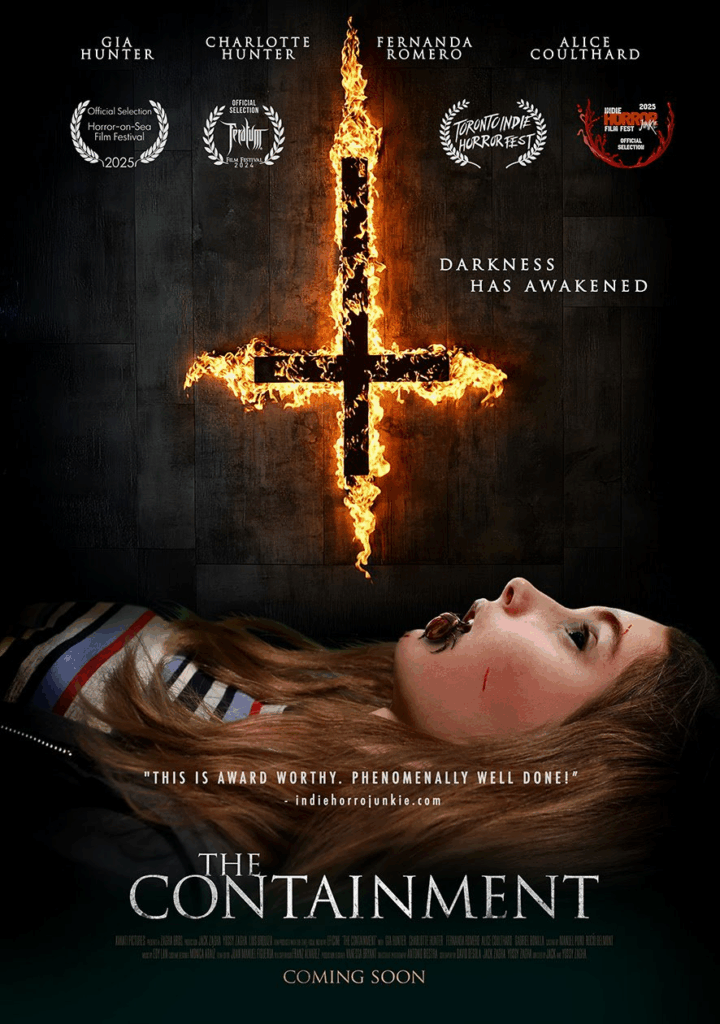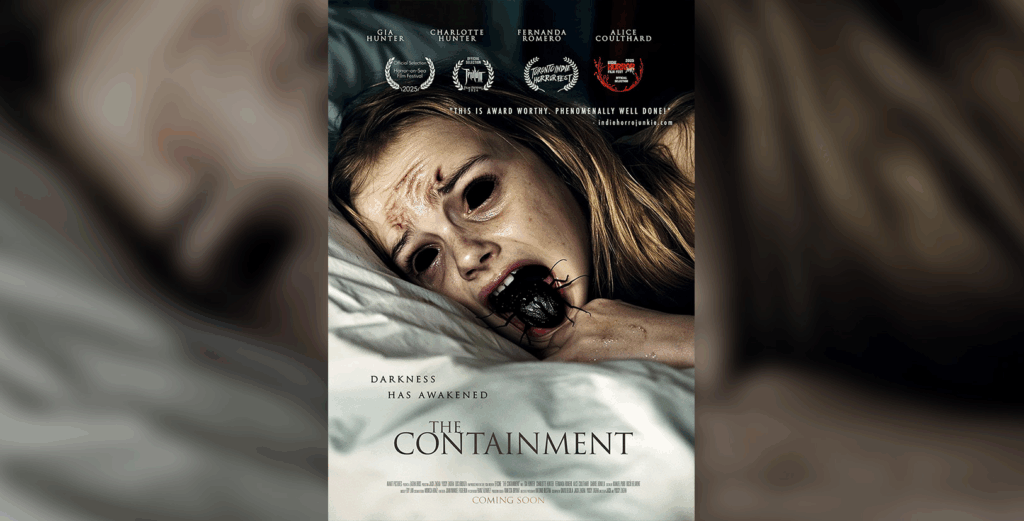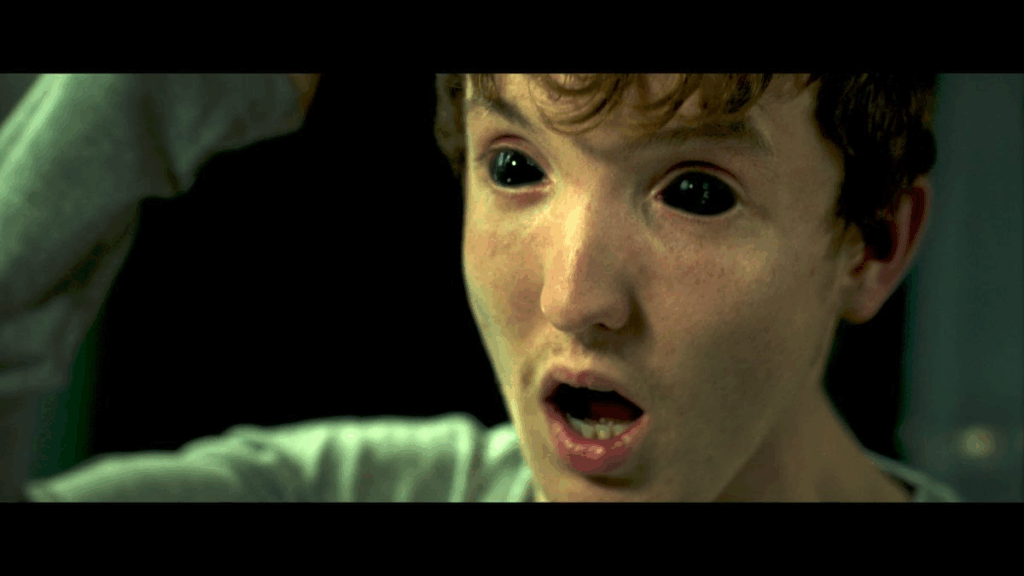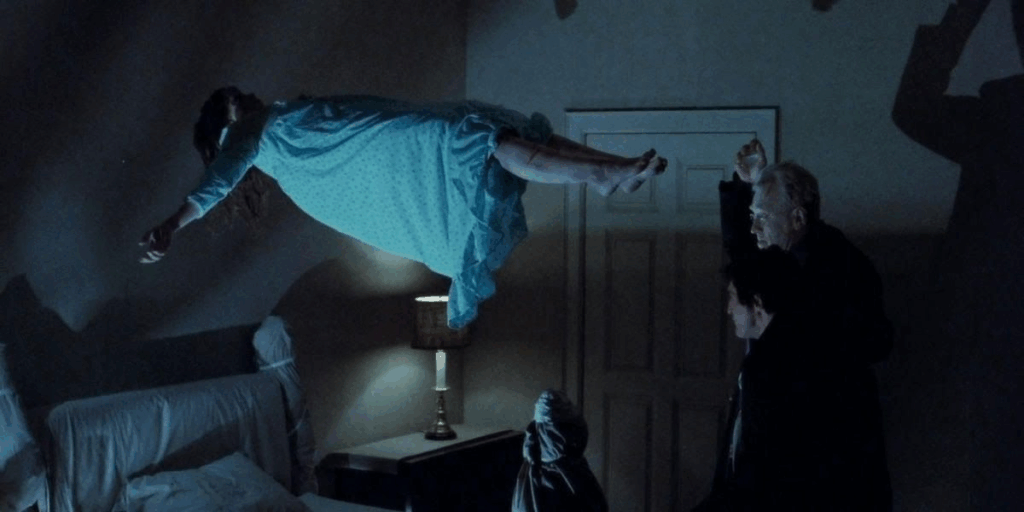𝐓𝐡𝐞 𝐂𝐨𝐧𝐭𝐚𝐢𝐧𝐦𝐞𝐧𝐭

Introducing The Containment (2025): A Haunting Dive into Grief and Supernatural Horror
In the ever-evolving landscape of horror cinema, The Containment (2025) emerges as a chilling and thought-provoking addition, blending psychological depth with spine-tingling supernatural elements. Directed by Jack Zagha Kababie and Yossy Zagha, this atmospheric horror film explores themes of grief, resilience, and the unknown through a narrative centered on a dark and sinister entity that possesses an innocent child. With a gripping storyline, standout performances, and a powerful ending that has sparked fervent discussion among viewers, The Containment is poised to captivate fans of smart, emotionally resonant horror. This article offers a comprehensive introduction to the film, delving into its plot, themes, cast, production, critical reception, and cultural impact.

Plot Synopsis: A Tale of Innocence and Malevolence
The Containment unfolds with a deceptively quiet premise that quickly spirals into a nightmare. The story revolves around a family grappling with profound loss, their emotional fragility setting the stage for an otherworldly intrusion. When a malevolent entity enters the body of a young child, the family is thrust into a harrowing battle against an unseen force that threatens to unravel their lives. The film masterfully balances intimate family dynamics with escalating supernatural terror, keeping viewers on edge as the true nature of the entity is revealed.
Without delving into spoilers, the narrative is structured around the family’s attempts to understand and combat the possession, drawing on both emotional and spiritual resources. The child, portrayed with unsettling authenticity, becomes a focal point for the film’s exploration of innocence corrupted by darkness. As the family seeks answers, they confront their own buried traumas, forcing them to question whether their fight is against an external evil or the shadows within themselves.
The film’s pacing is deliberate, building tension through quiet moments punctuated by shocking supernatural occurrences. Its 90-minute runtime ensures a taut experience, culminating in an ending that has been described as “mind-blowing” by some viewers for its layered implications. This ambiguous yet impactful conclusion invites audiences to revisit the film, uncovering new meanings with each viewing.

Themes: Grief, Resilience, and the Unknown
At its core, The Containment is more than a traditional horror film; it’s a meditation on human vulnerability and strength. The theme of grief permeates the narrative, as the family’s loss serves as both a catalyst for the supernatural events and a lens through which they confront their pain. The film subtly explores how unresolved sorrow can leave individuals open to darker forces, whether metaphorical or literal, making it a poignant allegory for emotional healing.
Resilience is another central theme, embodied in the characters’ refusal to succumb to despair despite overwhelming odds. The family’s determination to protect their child, even as the entity grows stronger, underscores the power of love and unity in the face of unimaginable horror. This theme resonates universally, offering viewers a cathartic exploration of hope amidst darkness.
The unknown is perhaps the film’s most unsettling theme, as the entity’s origins and motives remain shrouded in mystery. By leaving certain questions unanswered, The Containment taps into primal fears of the incomprehensible, echoing classic horror works like The Exorcist or Hereditary. This ambiguity fuels the film’s lingering impact, encouraging audiences to grapple with their own interpretations of the supernatural.

Cast and Performances: A Showcase of Emotional Depth
The film boasts a talented ensemble cast, led by Gia Hunter, Alice Coulthard, Fernanda Romero, and Jack Gouldbourne. Each actor delivers a nuanced performance, grounding the supernatural elements in raw human emotion. Gia Hunter, in particular, shines as a parent torn between despair and determination, her portrayal anchoring the film’s emotional core. Alice Coulthard brings a haunting intensity to her role, capturing the complexity of a character caught in the crosshairs of grief and fear.
The child actor, whose identity is kept under wraps to preserve the film’s mystique, delivers a performance that is both heartbreaking and terrifying. Their ability to shift seamlessly between innocence and malevolence is a standout, drawing comparisons to iconic child performances in horror, such as Linda Blair in The Exorcist. Fernanda Romero and Jack Gouldbourne round out the cast with compelling supporting roles, adding layers to the family dynamic and the broader narrative.
The chemistry among the cast members enhances the film’s authenticity, making the family’s struggle feel palpable. Director Jack Zagha Kababie’s focus on character-driven storytelling allows the actors to shine, ensuring that the horror is as emotionally resonant as it is frightening.

Production: Crafting an Atmospheric Nightmare
The Containment is a testament to the power of independent filmmaking, with its modest budget yielding a visually striking and atmospherically rich experience. Directed by Jack Zagha Kababie and Yossy Zagha, the film showcases their ability to create tension through meticulous craftsmanship. The directors employ a muted color palette and claustrophobic framing to mirror the characters’ emotional and physical entrapment, drawing viewers into the story’s unsettling world.
Cinematography plays a crucial role in the film’s success, with shadowy interiors and stark lighting amplifying the sense of dread. The sound design is equally effective, using subtle cues like distant whispers and sudden jolts to keep audiences on edge. The score, composed with restraint, enhances the film’s mood without overpowering its quieter moments.
Filming took place in undisclosed locations, adding to the film’s enigmatic aura. The production team’s decision to shoot in real, lived-in spaces rather than constructed sets lends authenticity to the family’s environment, making the supernatural intrusions feel all the more jarring. Despite its low-budget constraints, The Containment punches above its weight, proving that vision and creativity can rival high-budget spectacles.

Critical Reception: A Polarizing Yet Undervalued Gem
Since its release in 2024, The Containment has garnered a mixed but passionate response from critics and audiences. On IMDb, the film holds a 4.8 rating, reflecting a divide between those who found it underwhelming and those who consider it a hidden gem. Some viewers have criticized its pacing, deeming it too slow for mainstream horror fans, while others argue that its deliberate tempo enhances its emotional weight.
The film’s ending has been a lightning rod for discussion, with some dismissing it as confusing and others praising its depth. One IMDb reviewer noted, “An incredibly undervalued film because most people overlook its extremely powerful ending. Once you do get what the ending really means, IT ABSOLUTELY BLOWS YOUR MIND.” This sentiment underscores the film’s ability to reward attentive viewers, particularly those willing to engage with its thematic complexity.
Critics have lauded the film’s performances and atmosphere, with particular praise for Sheila Reid’s supporting role (though she is not listed in the main cast, suggesting a possible cameo or confusion with the 2015 film of the same name). The film’s exploration of grief and resilience has been highlighted as a strength, with reviewers comparing it favorably to introspective horror films like The Babadook. However, some have noted that its low-budget production occasionally shows through, with minor technical flaws detracting from the overall experience.

Despite its polarizing reception, The Containment has cultivated a dedicated fanbase, particularly among horror aficionados who appreciate its psychological depth and refusal to rely on jump scares. Its status as an “undervalued” film suggests that it may find a cult following in the years to come, much like other initially overlooked horror classics.
Cultural Impact: A Timely Reflection on Fear and Loss
Released in 2024, The Containment arrives at a time when global anxieties about loss, uncertainty, and the unknown remain prevalent. While the film is not explicitly tied to contemporary events, its themes of grief and resilience resonate with audiences navigating personal and collective challenges. The possession narrative serves as a metaphor for internal struggles, inviting viewers to reflect on how trauma can manifest in unexpected ways.
The film’s focus on a family unit also taps into universal fears of losing loved ones, making it relatable across cultural contexts. Its understated approach to horror, prioritizing atmosphere over gore, aligns with a growing trend in the genre toward psychological and emotional storytelling. By drawing on classic horror tropes while offering fresh perspectives, The Containment contributes to the ongoing evolution of horror cinema.

Social media discussions on platforms like X have been limited, but the film’s provocative ending has sparked online debates among horror communities. As more viewers discover the film through streaming platforms, its cultural footprint is likely to grow, particularly if it gains traction as a cult favorite.
Comparison to the 2015 Film Containment
It’s worth noting that The Containment (2025) shares its title with a 2015 British thriller directed by Neil Mcenery-West, which has caused some confusion among audiences. The 2015 film, set in a Southampton tower block, focuses on a viral outbreak and quarantine, earning praise for its claustrophobic tension and a 92% approval rating on Rotten Tomatoes. While both films explore themes of confinement and fear, they differ vastly in genre and execution, with the 2024 film leaning into supernatural horror and the 2015 film embracing sci-fi thriller elements.
Viewers searching for The Containment should be mindful of this distinction to avoid conflating the two. The 2024 film’s unique identity as a psychological horror experience sets it apart, offering a fresh take on the “containment” concept through a supernatural lens.

Why Watch The Containment?
The Containment is a must-watch for horror fans who crave stories that linger long after the credits roll. Its blend of emotional depth, atmospheric tension, and a thought-provoking ending makes it a standout in the genre. While it may not satisfy those seeking fast-paced scares or explicit resolutions, it rewards viewers who appreciate nuanced storytelling and complex themes.
The film’s exploration of grief and resilience offers a universal appeal, while its supernatural elements deliver the chills expected of a horror classic. With strong performances, particularly from Gia Hunter and the young actor at its center, The Containment proves that independent horror can rival mainstream offerings in impact and artistry.

Conclusion: A Haunting Journey Worth Taking
The Containment (2024) is a bold and haunting addition to the horror genre, weaving a tale of grief, resilience, and supernatural terror that challenges viewers to confront the unknown. Directed with precision by Jack Zagha Kababie and Yossy Zagha, and elevated by a committed cast, the film delivers an experience that is as emotionally resonant as it is unsettling. Its polarizing reception only adds to its intrigue, inviting audiences to form their own interpretations of its enigmatic narrative.
Whether you’re drawn to psychological horror, family dramas, or stories that defy easy answers, The Containment offers something to ponder and fear. As it finds its audience through word-of-mouth and streaming platforms, this undervalued gem is poised to leave a lasting mark on horror cinema. Dim the lights, brace yourself, and let The Containment take you on a journey into the heart of darkness.